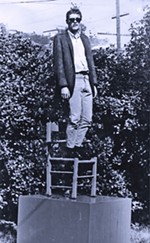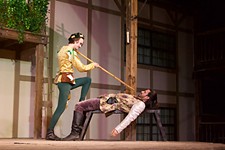Exhibitionism
Managed Care: Down the Rabbit Hole
Fri., Sept. 19, 1997
 Hyde Park Theatre,
Hyde Park Theatre,through September 24
Running time: 1 hr
Go ask Alice...
...if you want to know what it is to have the earth drop from under your feet and your body fall through space, down, down, no bottom in sight and no way to stop your descent; if you want to know what it is to run and run without moving ahead even an inch, the faster you run the harder it is just to stay in place; if you want to know what it is to be thrown off-balance by figures of fierce temper and odd behavior whose words and deeds war with each other; if you want to know what it is to ingest substances that change you in unpredictable ways.
Or, much closer to home, you could go ask Steven. Judging by his latest work for the stage, Austin economist and monologist Steven Tomlinson has endured every extreme experience known to Lewis Carroll's heroine and then some. His Managed Care is a trip down a rabbit hole of the late 20th century, where the author must wander dazedly through a Wonderland of HMOs and MRIs and antidepressants with lots of Vs and Xes in their names, home to such uncommon folk as a bag lady cadging quarters to fill her "prescription" from Dr. George Dickel, an exuberantly sympathetic sufferer of anxiety attacks, and a chatterbox masseur who plays tapes of Russian monks chanting as he kneads his clients' flesh.
His story begins, Tomlinson tells us, in the parking lot of the Whole Foods Market at Sixth and Lamar, where he observes with mounting frustration the progressive, right-thinking customers of this bastion of environmental morality flouting the law when it comes to driving and parking their sports utility vehicles. Sparked by his calling to be "the free-range conscience of the world," Tomlinson tries to address this injustice. But when he's rebuffed by various representatives of Whole Foods, his frustration settles somewhere inside him and begins to throw his system out of whack. Soon, he's suffering dizzy spells, then numbness, then panic attacks. He searches for treatment, first from modern medicine, with its relaxants and resonance imaging, then from holistic sources, with their high concept diets and bodywork, but each "cure" is more bewildering than the last.
For Tomlinson, this is an unsettling, disorienting odyssey. But for his audience, it is more like a carnival thrill ride: a racing, rolling rush up and around and through a colorful, cockeyed fair, the sudden turns, the drops and bounces, the breakneck speed inspiring giddiness, delight. Tomlinson crafts his images with such care, such clarity, that we can see the precise shade of blue in the pool in which he's swimming, can hear the chirp of the crickets on an Oklahoma summer eve, can feel the pressure on his chest when he feels himself smothering in the dark. And his skill with language not only carries us into his vivid world, it illuminates it with firework bursts of character and aburdity that dazzle. As a performer, Tomlinson is naturally engaging -- a tall stalwart in the Jimmy Stewart mold -- and he capitalizes on that, but here he pushes himself (or his director, David Mark Cohen, pushes him) to new levels of comedic invention that make him exceptionally appealing and compelling.
Steven Tomlinson's performances are rare, so when one comes along, it must be noted with fanfare. It's here! It's here! Step right this way for a ride that will whirl you and tickle you and leave you in a different place. Go ask Alice. -- Robert Faires
BURNIN' HOPE: SEX & DEATH & DAYTIME TV
John Henry Faulk Theatre
through September 27
Running Time: 1 hr, 45 min
Daytime TV is like modern day Greek tragedy. Think about it. Ricki Lake's guests have nothing over Oedipus, and Medea would be a huge hit on Jerry Springer. The chorus, which is around largely to comment upon the action, was the Greeks' answer to a studio audience. The major themes of Aristophanes and Euripedes were death and sex. The major themes of daytime TV are, you guessed it, death and sex.
It was only a matter of time before some sick and clever mind decided to try a closer, and somewhat incestuous, marriage of the two. The demented offspring of this union is Jim Fritzler's Burnin' Hope.
Loosely the story of a love triangle gone haywire, this script pits dysfunction against dysfunction with a wry and occasionally blatant commentary on the sad state of modern life thrown into the lulls of this battle of (half-)wits. It is an effective and engaging piece of work whose tendency to become overly self-referential is more than compensated by Fritzler's knack for characterization and humor.
Watching this show's high-octane cast, with Lana Dieterich, Shelby Brammer, Ann Perea, Dana Younger, and Mike McKinley, is like watching an episode of Talk Soup; only the finest moments have been culled from the crap. Dieterich and McKinley are a scream as game/talk show hosts gone insane, while Brammer and Perea truly capture what we all expect the daytime TV audience to be. Younger is perfect as the blackhearted, gape-mouthed husband with a chip on his shoulder.
Simply staged on a set that looks like it could have been borrowed from the local trailer park, Burnin' Hope clips right along, due largely to the rambunctious pace of Fritzler's Durang-esque script and frenetic direction. Unfortunately, a few episodes are not exploited to their full scenic and costumed potential, probably due both to a lack of funds and flyspace in the John Henry Faulk Theatre. This is a bare-bones production that, at its best, doesn't stand between the talented cast and the audience who is enthralled by them.
-- Adrienne Martini
DAVID'S REDHAIRED DEATH: WATCHING WITHOUT BLINKING
 Hyde Park Theatre,
Hyde Park Theatre,
through October 4
Running time: 2 hrs
This is the story of the redheads.
Brought together by a friend, united in their uniqueness, the redheads struggle to create a bond despite past failures. In David's Redhaired Death, a "girl meets girl" story produced by Frontera@Hyde Park Theatre, the redheads map and dissect their affair in distinct detail, despite the pain that this unflinching look must engender.
But this is also the story of memory, of the ritual retelling of a soul-shattering event that you must simply keep reliving in order to find some way to package it into your psyche so that you can move on. It hurts to watch someone carefully retrace their steps, trying to find an alternate solution, while being forced into the same answers because the truth of the memory must always win, on both a personal and global level. If only Kennedy had skipped the motorcade. If only Lennon had stayed in. If only Diana had had a different driver. No amount of playing with the variables will change the end and you have to find a way to watch its occurrence without blinking.
You don't want to blink while watching Roxy Becker and Barbara Chisholm in this production of Sherry Kramer's play, however. Becker and Chisholm capture both the subtle nuance and hard-edged truths of this play with their complex characterizations. These two powerhouses amplify each other, setting up a dynamic and delightful feedback that jumps off the stage. Yes, they are that good.
Largely, this ebullient energy is echoed in the rest of the production. Megan Monaghan's direction keeps these racehorses in stride by deftly crafting their movements and their pacing. Jason Amato's dappled lights carefully capture the feel of each moment, from the heights of excitement to the depths of hopelessness.
There are, however, some elements which ring hollow in this account that strives to tell the unflinching truth about love and loss. Amato's massive wooden set hampers the fluidity of the action while the Men, played by Stephen Garris and Jeff Griffin, are not integrated into the story itself and seem to serve no real purpose, despite the actors' best efforts. Kramer's script, expanded from a one-act, is overly padded in parts and, at times, slows the story with its repetitiveness.
To be honest, however, these are only details that can be discovered after the story has been told, once the actors leave the stage and you are allowed to blink again. -- Adrienne Martini








